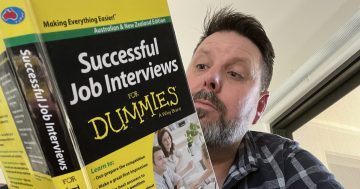Rachel Jay* says while there’s often no right or wrong answer to strange interview questions, there are ways we can prepare ourselves to answer in the best way possible.
 Perhaps you’re a pro at answering all the typical interview questions.
Perhaps you’re a pro at answering all the typical interview questions.
You can list your strengths and weaknesses with ease, and you know to never talk down about a previous boss.
But you’re in an interview that’s wrapping up and you’re suddenly asked, “So, if you were a salad, what kind of dressing would you have?”
If your internal thought is something like, “Um, what?!” you’re probably not alone.
Curveball interview questions are often used by hiring managers to assess how candidates respond when caught off guard and to see a different side of their personality.
While there’s no right or wrong answer to curveball interview questions, there are ways you can prepare yourself to answer in the best way possible.
Tips for handling curveball interview questions
Stay calm and reveal your thought process.
One of the reasons hiring managers ask strange interview questions is to throw you off your game a bit … to see how you perform under pressure and get a better sense of your thought process.
So, no matter how nervous the question makes you, or how surprised you are to hear it, try your best to keep your cool.
You’ll also want to think out loud.
This will show the hiring manager your process — and also prove that there’s some real thought behind your response.
For instance, if they ask, “If you were a tree, what type of tree would you be?”, don’t just say, “A palm tree!”
Instead, explain how you got to that answer.
“Well, I consider myself to be fairly tough and flexible — and I’m always growing, especially in my career.”
“So, I’d say I’m most like a palm tree.”
Don’t take them at surface level.
Realise that there’s always a reason behind asking a curveball interview question on the part of the interviewer.
For example, if you’re asked, “What kind of superhero would you be?”, they don’t actually want to know that information just for fun.
They’re likely trying to assess how well you’d fit on the team, and if you’re more of a leader or a follower.
Assess what information the interviewer is trying to glean from asking you these types of questions and you’ll keep yourself in the running.
Take time to answer.
It’s OK to take a moment and think about your answer.
Hiring managers know that they’re throwing you a curveball question, and they won’t expect you to have the perfect answer off the bat.
As mentioned in the previous tip, determine what the interviewer is really trying to get at, and take a few seconds to think over your answer.
Saying something like, “That’s a fun question! Let me think about it for a minute,” will buy you some time.
Show your personality.
If you’re thrown a curveball interview question, it’s OK to let your personality shine!
Smile and even make a joke if it’s appropriate.
While interviewers want to see how you answer the question, they also want to see your personality and how you handle an odd question off the cuff.
If you’re totally thrown off by a question, it’ll probably show through, and they might infer that you can’t go with the flow or deal with unexpected issues in the workplace.
Relax and answer in a way that will show you are an ideal candidate.
Ask to answer later.
While this probably isn’t the most ideal option, if you’re truly drawing a blank, ask to come back to the question later.
You could say something like “I want to think a little more about this one … can we circle back to it later?”
This can buy you some time to be mentally preparing an answer.
To keep you from getting stuck, remember to not think too hard about it.
Come up with a positive answer that shines a light on part of your personality or your work ethic.
Practise.
The best way to answer curveball interview questions with ease is to practice.
A quick Internet search will find you plenty of sample questions.
Try answering a few to get you into the right headspace.
You can even find sample answers if you’re stuck on the best way to answer.
Practise on your own, or even with a friend to get some feedback.
While there’s no way to know if you’ll even be asked any crazy questions, practising will properly prepare you to answer any questions that come your way!
* Rachel Jay is an editor and writer for FlexJobs.
This article first appeared at www.flexjobs.com.











